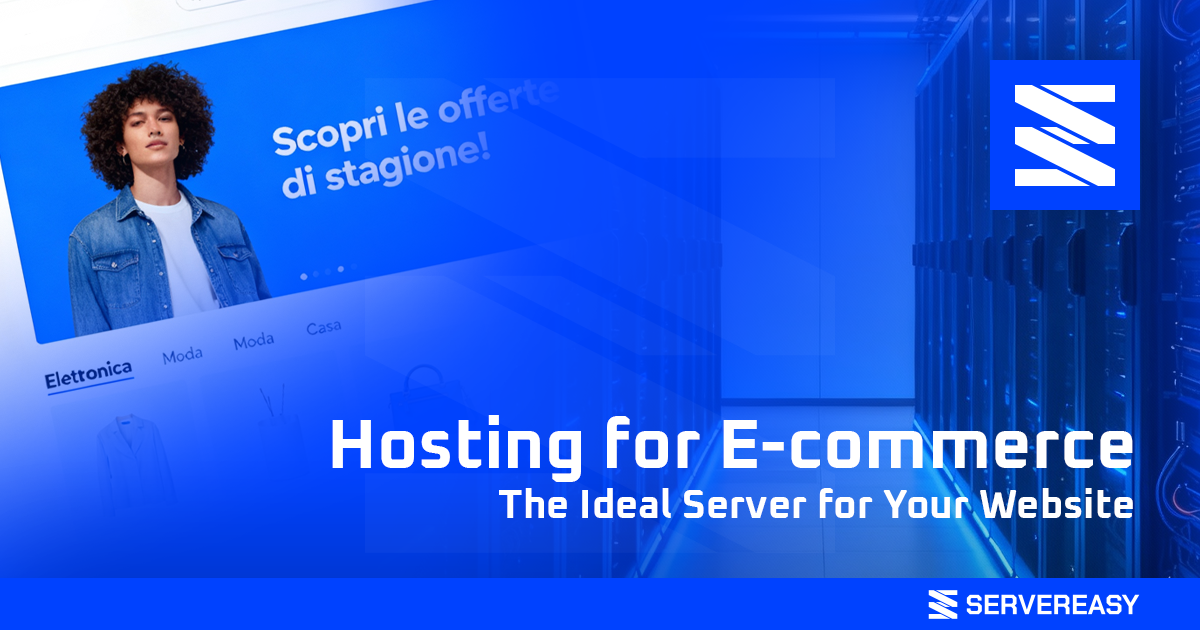
Hosting for E-commerce: The Ideal Server for Your Website
Choosing a professional Hosting for E-commerce is a critical factor for the success of your online store. Every second of delay in page loading can cost thousands of euros in lost sales, while downtime during Black Friday can compromise the entire annual turnover.
Google penalizes slow sites in search rankings, further reducing visibility and potential sales.
In this complete guide, we’ll explore everything you need to know to choose the ideal e-commerce server: from specific hardware requirements for platforms like WooCommerce, Magento, and PrestaShop, to optimal configurations for handling traffic spikes, and critical considerations regarding PCI-DSS security and customer data protection.
Why Traditional Hosting Isn’t Enough for an E-commerce
The Limits of Shared Hosting Plans
Many entrepreneurs start their e-commerce with a shared hosting service, but this choice comes with significant risks:
- Unpredictable performance: Resources shared with hundreds of other sites cause slowdowns during traffic peaks
- Technical limitations: Inability to install critical extensions or optimize configurations for online sales
- Compromised security: Shared vulnerabilities that can expose customers’ sensitive data
- Frequent downtime: Service interruptions that directly translate into lost sales
E-commerce sites on shared hosting lose an average of 23% of potential sales due to performance and reliability issues. Moreover, all these platforms have an administrative control panel that should be high-performing.
When It’s Time to Move to a Dedicated Server: Hosting for E-commerce
Switching to a dedicated server for e-commerce, regardless of the operating system, becomes necessary when:
- Monthly revenue exceeds €10,000 (the server cost becomes negligible compared to revenue)
- Traffic surpasses 10,000 monthly visits or experiences significant seasonal peaks
- You manage a catalog with over 1,000 products or use advanced features
- You collect online payments and need strict PCI-DSS compliance
- You require complex integrations with ERP, CRM, or logistics systems
Specific Hardware Requirements for E-commerce Platforms
WooCommerce: The WordPress Solution for E-commerce and Online Shops
WooCommerce powers over 28% of all online e-commerce stores. To ensure optimal performance:
|
Store Size
|
Products
|
Visits/month
|
CPU
|
RAM
|
Storage
|
|
Small
|
< 500
|
< 50,000
|
4–6 cores
|
16GB
|
100GB SSD
|
|
Medium
|
500–2,000
|
50,000–200,000
|
8 cores
|
32GB
|
250GB NVMe
|
|
Large
|
> 2,000
|
> 200,000
|
12+ cores
|
64GB+
|
500GB+ NVMe
|
Recommended optimal configuration Hosting for E-commerce:
- AMD Ryzen 7900X3D or higher processor to handle PHP and databases
- DDR5 ECC RAM to ensure stability during peak loads
- NVMe storage in RAID 1 for speed and redundancy
- Redis cache to reduce database load
Magento/Adobe Commerce: The Enterprise E-commerce
Magento is notoriously demanding but offers advanced enterprise features:
- CPU: Minimum 8 high-frequency cores, ideally 16+ cores for high-traffic stores
- RAM: 32GB for basic setups, 64–128GB for enterprise stores with large catalogs
- Storage: 500GB+ NVMe in RAID configuration for database and media
- Database: MySQL 8.0+ or MariaDB 10.6+ optimized with specific configurations
Magento particularly benefits from processors with extended L3 cache, such as the AMD Ryzen 7950X, which can improve performance by up to 40% compared to standard solutions.
PrestaShop: Balance Between Functionality and Performance
PrestaShop offers a solid compromise between power and hardware requirements:
- CPU: 6–8 cores for medium-sized stores
- RAM: 16–32GB depending on the number of products and installed modules
- Storage: 200GB SSD/NVMe with automatic backups
- Cache: Implementation of Memcached or Redis to optimize database queries
Shopify Plus and Headless Platforms
For headless implementations or complex integrations with Shopify Plus:
- CPU: 8–12 cores to handle APIs and microservices
- RAM: 32–64GB for Node.js or React applications
- Storage: NVMe to reduce latency in API calls
- Network: 10 Gbps connectivity to handle high API traffic
Performance Optimization to Maximize Conversions
The Impact of Speed on Sales
Loading speed has a direct and measurable impact on sales:
- 1 second delay = -7% conversions
- 2 seconds delay = -14% conversions
- 3 seconds delay = -53% abandonments
For an e-commerce generating €100,000 per month, even a 1-second delay can cost €7,000 per month in lost sales — that’s €84,000 per year.
Hosting for E-commerce E-commerce Security: Protecting Customer Data
PCI-DSS Compliance
If you accept credit card payments directly on your site, you must comply with the PCI-DSS (Payment Card Industry Data Security Standard):
- Configured firewall: Protects the payment network
- Data encryption: Secure transmission and storage of sensitive information
- Anti-malware program: Protection against malicious software
- Secure systems and applications: Regular updates and security patches
- Access control: Restriction of access to cardholder data
- Monitoring and testing: Regular verification of networks and systems
A dedicated e-commerce server facilitates PCI-DSS compliance thanks to full isolation and total control over the security configuration. Building a site and assessing the best hosting for your business will give you a significant advantage over less organized competitors.
DDoS Protection Hosting for E-commerce
DDoS attacks represent a real threat for e-commerce, especially during high-sales periods:
- Volumetric attacks: Saturate available bandwidth, making the site unreachable
- Application attacks: Overload specific functions such as cart or checkout
- Extortion attacks: Threaten to take the site down during critical events
An advanced DDoS protection system like Servereasy’s proprietary one can mitigate attacks up to 1.2 Tbps, ensuring that your e-commerce remains online even during attack attempts.
These configurations can be complex and require advanced technical skills for web hosting. For this reason, at ServerEasy, our hosting solutions come pre-configured with all these optimizations out of the box.
Hosting for E-commerce SSL/TLS Certificates and HTTPS
Since 2018, Google penalizes sites without HTTPS, and modern browsers display “not secure” warnings for HTTP sites:
- SSL/TLS certificates: Mandatory for any e-commerce
- TLS 1.3: Latest version for maximum security and performance
- HSTS: Forces HTTPS connection for all visitors
- EV certificates: Display the company name in the address bar (increases trust)
Backup and Disaster Recovery
For an e-commerce, data loss can be catastrophic:
- Automatic daily backups: With at least 30-day retention
- Off-site backups: Copies stored in geographically separate datacenters
- Restore testing: Regular verification of data recovery capability
- Defined RTO and RPO: Clear objectives for recovery time and acceptable data loss
Hosting for E-commerce Managing Seasonal Traffic Peaks
Black Friday, Cyber Monday and Holidays
E-commerce sites experience extreme traffic spikes during sales events:
- Black Friday: Up to 10x higher traffic than average
- Cyber Monday: Consecutive second peak testing infrastructure resilience
- Christmas: Extended period of high traffic (November–January)
- Seasonal sales: Predictable yet significant spikes
Choosing the right e-commerce hosting is a strategic investment that directly impacts your online store’s revenue. A dedicated server Hosting for E-commerce for your online business is not just a technical choice — it’s a real business asset that can determine the success or failure of your e-commerce.
Servereasy offers dedicated servers specifically configured for e-commerce, featuring next-generation hardware (AMD Ryzen and Epyc processors), high-performance NVMe storage, proprietary DDoS protection, and specialized technical support available 24/7.
Our experts understand the specific needs of e-commerce businesses and can help you configure the ideal infrastructure to maximize your online sales.
Don’t let an inadequate infrastructure limit your e-commerce potential. Tou can select power Hosting for E-commerce. Every second of delay costs sales, and every minute of downtime erodes customer trust.
ServerEasy Answers:
What’s the difference between shared hosting and a dedicated server for e-commerce?
A dedicated e-commerce server provides hardware resources entirely dedicated to your online store, ensuring consistent and predictable performance. Shared hosting divides resources among hundreds of sites, causing slowdowns during traffic peaks and technical limitations that can compromise sales. For e-commerce generating over €10,000/month, a dedicated server is essential to guarantee the speed, security, and reliability needed to maximize conversions.
How much RAM do I need for a WooCommerce store with 1,000 products?
For a WooCommerce store with about 1,000 products, you should have at least 32 GB of RAM. This allows efficient management of the database, Redis caching, and traffic spikes without performance degradation. If you use many plugins or have high traffic (100,000+ monthly visits), consider 64 GB to ensure stability during major sales events like Black Friday.
How can I protect my e-commerce from DDoS attacks during Black Friday?
To protect your e-commerce during critical events such as Black Friday, use advanced DDoS protection like Servereasy’s — including volumetric mitigation (up to 1.2 Tbps), intelligent filtering to distinguish legitimate from malicious traffic, and Layer 7 protection to defend checkout and cart pages. Also implement real-time monitoring, rate limiting to prevent abuse, and ensure 24/7 technical support during the event.
Magento or WooCommerce: which requires more server resources?
Magento is significantly more resource-intensive than WooCommerce. A medium-sized Magento store requires 32–64 GB of RAM and 8–16 CPU cores, while WooCommerce performs well with 16–32 GB and 6–8 cores. Magento offers advanced enterprise features but demands powerful hardware and tuning, whereas WooCommerce is lighter and ideal for small to mid-sized businesses.
What is PCI-DSS compliance and why is it important for my e-commerce?
PCI-DSS compliance (Payment Card Industry Data Security Standard) defines security requirements for handling credit card data. It protects customers’ sensitive information, prevents fraud, and avoids fines up to €500,000 for non-compliance. A dedicated server simplifies compliance through full isolation, total control over security settings, and the ability to deploy dedicated firewalls and advanced encryption.
How can I reduce my e-commerce loading time below 2 seconds?
To reduce page load time:
1) Use a dedicated server with NVMe storage and high-performance CPUs;
2) Implement multi-level caching (page, object with Redis, opcode);
3) Optimize images with WebP and lazy loading;
4) Use a CDN;
5) Minify CSS and JS;
6) Enable HTTP/2 or HTTP/3;
7) Optimize your database with proper indexes;
8) Remove unnecessary plugins.
With Servereasy’s optimized setup, you can achieve load times under 1 second.
When should I move from a single server to a multi-server architecture?
You should upgrade to a multi-server architecture when:
1) Monthly revenue exceeds €200,000;
2) Traffic surpasses 500,000 visits/month;
3) CPU or RAM usage consistently exceeds 70–80%;
4) You require high availability or geographic redundancy;
5) The database becomes a performance bottleneck.
A typical setup separates web, database, and cache servers, optionally adding load balancers to distribute traffic efficiently.
What are the hidden costs of a server for e-commerce?
Beyond the base server cost, consider:
1) SSL certificates (free with Let’s Encrypt, €100–300/year for EV);
2) Software licenses (OS, control panels, etc.);
3) Extra backup and storage for extended retention;
4) CDN costs for heavy traffic;
5) Advanced monitoring and security;
6) Specialized technical support for e-commerce;
7) Migration fees when changing providers;
8) Consulting for optimization and PCI-DSS compliance.
With Servereasy, many of these are already included — DDoS protection, backups, and technical support.

